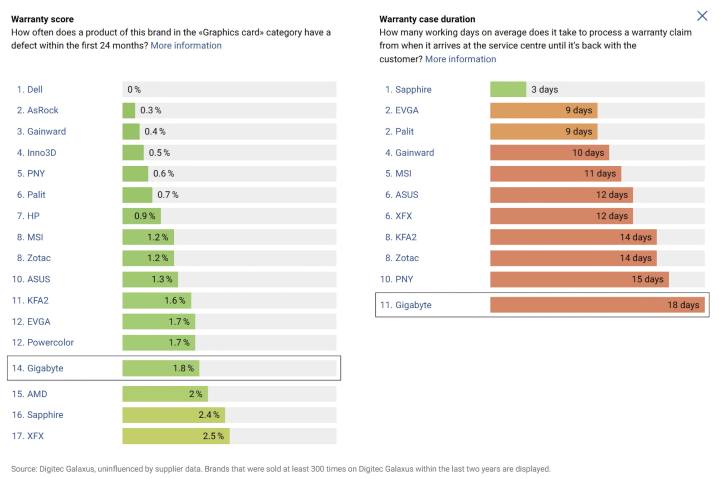When discussing which is the best graphics card, performance is usually the most important detail. But something that is often overlooked is how reliable a graphics card is. It can be heartbreaking to buy a powerful, new GPU only to have something go wrong and spoil the fun just a few months after getting it.
This information isn’t always easy to find, so it’s great to see that Digitec Galaxus, a Swiss online retailer, is now displaying warranty scores and return rates for many of the products it sells. This information was highlighted by GaoHAQ on Reddit recently, along with two charts comparing reliability and warranty support for top graphics card manufacturers.

One of the most notable details was a surprisingly high defect rate for Gigabyte graphics cards. According to Digitec’s information, 1.8% of these GPUs have problems within 24 months of usage. Equally troubling is a chart that claims Gigabyte takes an average of 18 days to process a warranty claim.
No manufacturer is perfect, and an occasional defect is normal. Making customers wait for their warranty to be processed is another matter, and prompt service is the best way to ease someone’s mind.
Dell managed to score the best in Digitec’s defect chart and didn’t have enough warranty claims to appear on the second graph. MSI and Zotac are comfortably positioned in the middle of the defect chart. MSI was tops with a warranty case duration of 11 days compared to Zotac’s 15-day average.
This is just a sampling of data and might not apply to worldwide sales. Digitec notes in the fine print that the information is taken from brands that had at least 300 sales in the last two years, so it doesn’t account for earlier issues and is based on a relatively small amount of data.



